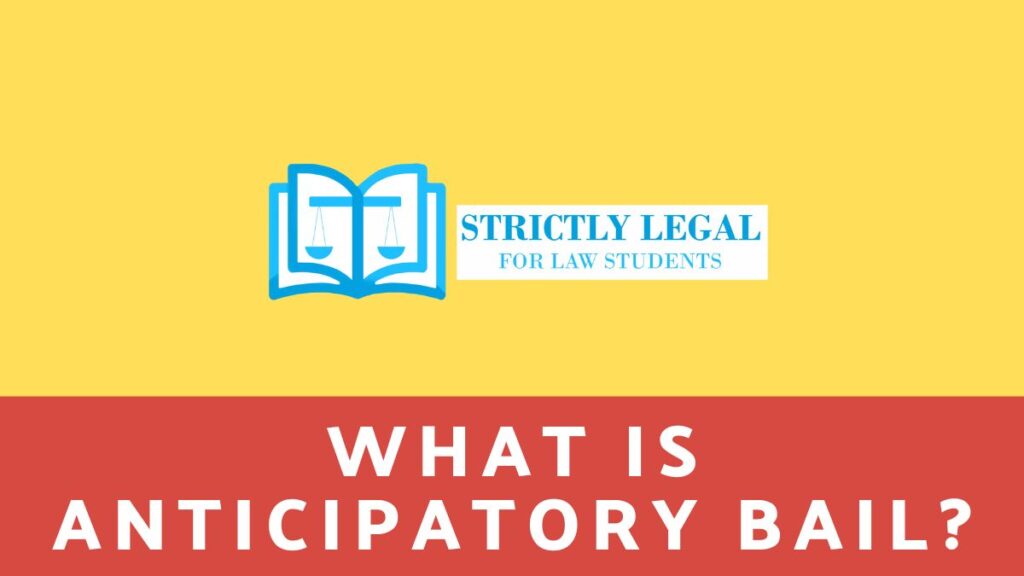Table of Contents
What is a Bail?
Bail in simple terms is a recognisance of a written bond that a person will appear before the court when he is called for.
Bail is a provisional release and in Indian law, there are two types of offences bailable and non-bailable offenses. In a bailable offence, the accused has a legal right to be released on bail, and in the time of incarnation or arrest, the police are allowed to issue bail to the defendant. But in non-bailable offences the accused cannot demand bail as a matter of right. The process to apply for bail depends upon the stage of the trial at which the bail is asked for.
The Code of Criminal Procedure 1973 deals with the terms of bail.
AAlso Read: Types of Bail under the Code of Criminal Procedure
What is an Anticipatory Bail?
Section 438 of the Criminal Procedural Code deals with anticipatory bail. Though the word anticipatory is not defined anywhere, this section lays that when any person apprehends that he may get arrested on accusation of committing a non-bailable offence, he may apply to the High Court or Court of Sessions that if such arrest happens then he shall be released on bail.
What is the object of this provision?
The 41st Law Commission Report on 24th September 1969 bought out the importance and need of anticipatory bail. An anticipatory bail will ensure that Right to life with dignity and personal liberty enshrined in our constitution in the form of fundamental rights is reached to all citizens at any stage of a trial. It prevents the harm caused to a person’s reputation due to who has been falsely arrested.
In the case of Gudikanti Narasimhulu v. Public Prosecutor it was iterated by the court that personal liberty of an accused or convict is fundamental and it should not be suffering from lawful eclipse only in terms of procedure established by law.
Who can grant an Anticipatory bail?
According to section 438, it is the discretion of the judge in High Court or Sessions Court to grant anticipatory bail.
In the case of Balchand Jain v State of Madhya Pradesh, it was made clear that the power of granting anticipatory bail is an extraordinary power exercised by the court. However, it should only be used in exceptional cases.
When is it asked for?
Section 438 makes it clear that any person can apply for such bail when he has reason to believe that he may be arrested on the accusation of having committed a non-bailable offence.
In the case of Gurbaksh Singh Sibbia Etc vs State Of Punjab, the person applying for anticipatory bail must have a reasonable apprehension of getting arrested for a non-bailable ofence. If the apprehension is frivolous then the application might get rejected. Also, the court will objectively examine the application before granting bail.
Refusal to Anticipatory Bail
Section 498 clause (i) to (v) also gives out factors to be considered by the court before granting anticipatory bail. If these conditions are not satisfied and if there are doubts in the mind of the court then the bail application can be rejected.
- The nature and gravity of the accusation is the first thing to be considered. The role of the accused in the commission of the offence must be properly comprehended before making the arrest.
- The antecedents of the applicant include records of previously undergone imprisonment on conviction due to the commission of any cognizable offence.
- The possibility or probability of the applicant absconding from justice.
- The court will also make sure that accusations made to the applicant, should not be with the object of injuring or humiliating by arresting him/her.
On what grounds an Anticipatory Bail is granted?
In accordance with Bhadresh Bipinbhai Sheth vs. State of Gujarat & Anr. (Criminal Appeal No. 11340 of 2015) these are the following grounds of consideration laid down by the Supreme Court.
- The nature and gravity of the accusation is the first thing to be considered. The role of the accused in the commission of the offence must be properly comprehended before making the arrest.
- The antecedents of the applicant include records of previously undergone imprisonment on conviction due to the commission of any cognizable offence.
- The possibility or probability of the applicant absconding from justice.
- The court will also make sure that accusations made to the applicant, should not be with the object of injuring or humiliating by arresting him/her.
- The court also needs to scrutinize the impact of granting anticipatory bail, particularly in cases of high magnitude where a large number of people might get affected.
- Two factors need to be maintained and balanced while hearing the pleadings for the grant of anticipatory bail.
- The court should also consider the apprehension of tampering with the pieces of evidence and witnesses.
- Firstly, the courts need to ensure that the grant of anticipatory bail doesn’t affect the fair, free and full investigation of the matter at hand.
- Secondly, the accused is safe from undergoing any kind of harassment, humiliation, and unjust detention.
- If there is any doubt found in the authenticity of the prosecution, then the accused should be entitled to an order of bail.
- The possibility of repeating the same or similar offence by the accused.
Conditions imposed on the Applicant
When the court grants an interim order under section 438(1), he may impose the following conditions in accordance with the facts and circumstances of the case at hand.
- The applicant/ person shall make himself available as when required by the police officer for the purpose of interrogation.
- The applicant shall not, directly or indirectly, make any inducement, threat, pursuade or promise to any person who is acquainted with the facts of the case so as to hide anything from the Court or to any police officer;
- The applicant/person should not leave India without the previous permission of the Court.
- Conditions may be imposed under sub- section (3) of section 437, as if the bail were granted under that section.
Procedure for Anticipatory Bail
A person can seek anticipatory bail at different stages of prosecution.
- When no FIR has been lodged.
- Even if an FIR has been lodged but the arrest has not happened, then also it can be sought for. This application is allowed during both pre and post-investigation.
An application may be filed to the High Court or Court of Sessions.
Supreme Court in Gurbaksh Singh Sibbia v. State of Punjab stated that a notice should be issued to the Government advocate or the Public Prosecutor before passing final order granting anticipatory bail. Therefore, if certain circumstances justtify ex parte interim order, the court may pass such an order, and issue notice to the Public Prosecutor by making it returnable. And later may pass the final order after hearing both sides.
Conclusion
The Law Commission had recommended such a provision because it wanted to ensure that no individual’s liberty is put up at stake and it also becomes a means of protection from the arbitrary investigating body’s treatment.
Right to life with dignity is an important right granted by the constitution. If the justice system is utilized with ill intention there should be some remedy and preventive instruments that would save the diginity of the person being targeted.
The Parliament has restricted the grant of anticipatory bail for certain offences like rape. And special laws can rule out anticipatory bail as an exception.
I am law student and a freelance content writer who loves to write about anything and everything.




